Tag:highway=pedestrian
| Description |
|---|
| Roads mainly / exclusively for pedestrians |
| Rendering in OSM Carto |

|
| Rendering in OSM Carto |

|
| Group: highways |
| Used on these elements |
| Useful combination |
| See also |
| Status: approved |
| Tools for this tag |
|
A highway=pedestrian is a road or an area mainly or exclusively for pedestrians in which some vehicle traffic may be authorized (e.g. emergency, taxi, delivery, ...). Often found in shopping areas, town centres, places with tourism attractions and recreation/civic areas, where wide expanses of hard surface are provided for pedestrians to walk, but also may be found in residential communities designed to be navigated primarily by foot.
In English-speaking countries, "mews style" housing is a term which may be used to describe urban residential developments which are fronted on a pedestrian street. This term originates from British urban residential areas which were developed to cater to horse and carriage transportation prior to the proliferation of the automobile. In the present day, the term "mews" can be seen in both older communities which have kept their historic name, and in newer communities designed to resemble those pre-automobile developments. The newer developments are often associated with the New Urbanism movement in urban planning. Contemporary mews style housing can take on many different forms and functions, and can be observed in social housing developments, communities designed for the elderly, and private gated communities, for example. Terraced houses are particularly common in "mews style" communities. Note that the presence of the term "mews" in a street, building, or community name is not necessarily an indicator of the current housing and street style in itself, as its use could be a historical holdover that has persisted after the built environment has changed, or a reflection of the whims of a developer unconcerned with the specificity of the description.
In American and Australian English, some pedestrian streets, particularly those located in commercial areas, may be referred to as pedestrian malls.
How to map
To map a pedestrianised road nothing other than a simple way is required. Add the highway=pedestrian tag to it and a name=* where applicable to make it complete. Generally, mappers use this tag only on wider streets which might accommodate other vehicles, although distinction from a highway=footway likely varies in definition from region to region.
Squares and plazas
An area (closed way or multipolygon) tagged with highway=pedestrian + area=yes is the most common way to map the pedestrian area of a square or plaza, where pedestrians can travel freely in all directions. If there are roads passing through the area of the square, map them as usual and make connecting nodes at all intersections with the pedestrian area. Also other paths such as highway=footway as well as roads have to connect with the edge of the pedestrian area where they intersect. [However, note that few routers will route through the area, most will route around the edge of it.]
If there are features or areas within the square or plaza which are not part of the walkable pedestrian area, these should be excluded by creating a multipolygon relation and making them inner members.
Also see the tag place=square for named squares which might include other features, use the pedestrian tag for actual pedestrian areas only. Add a node at the centre of the square or draw the way at the outer limits of the pedestrian area, possibly even connecting with surrounding walls, fences, buildings, etc.
Vehicle access
Vehicles may be allowed during special hours to unload merchandise, but are often prevented from entering by bollards.
Cycling may be allowed, depending on the country or local restrictions. This can be specified with bicycle=yes or bicycle=no.
If cycling is legal, please add bicycle=yes to make it clear.
Country specific
Italy
In Italy, access for bicycles to pedestrian areas is allowed by default.[1] If you are mapping in Italy, you are encouraged to explicitly state bicycle=* when mapping highway=pedestrian in order to avoid ambiguity.
France
In France, access for bicycles to pedestrian areas is allowed in both directions, unless otherwise stipulated by the police authority, on condition that they maintain a walking pace and do not hinder pedestrians.[2] Access conditions can be specified to avoid ambiguity.
Examples
| Photo | Tags | OSM-Carto |
|---|---|---|

|
highway=pedestrian name=Lloydpassage |
 |
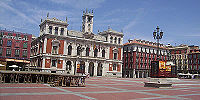
|
highway=pedestrian area=yes name=Weyher Marktplatz place=square |
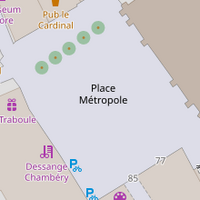
|

|
highway=pedestrian access:conditional=delivery @ (00:00-11:00) bicycle=yes |
|
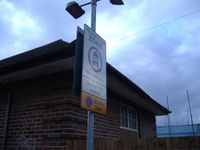
|
highway=pedestrian name=The Moorings motorcar=destination motorcycle=destination |
— |
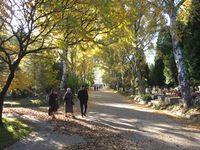
|
highway=pedestrian noname=yes Cases like this might also be tagged as a footway or a path, depending on the local community’s standards |
https://www.openstreetmap.org/#map=19/50.09722/19.97816 |
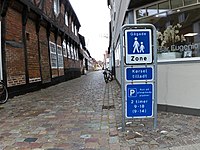
|
highway=pedestrian name=Fiskergade vehicle=yes note="Gågade" Pedestrian street with "Kørsel tilladt" vehicles allowed. Driving is allowed here, but (tourist)pedestrians are prioritized higher, so motorists basically can't expect to move faster than the pedestrian in front of them. Similar to highway=living_street, but slightly stricter on vehicles. |
References
See also
- area:highway=pedestrian - an area representation of pedestrian streets
- highway=footway - for designated footpaths; i.e. mainly/exclusively for pedestrians
- place=square - a named square (indicates a town or village square, which is an open public space common in urban centres, such as cities, towns or villages)
- Proposed features/Pedestrianised road
- Guidelines for pedestrian navigation
| ||||||||||||||||||||||||||||||
